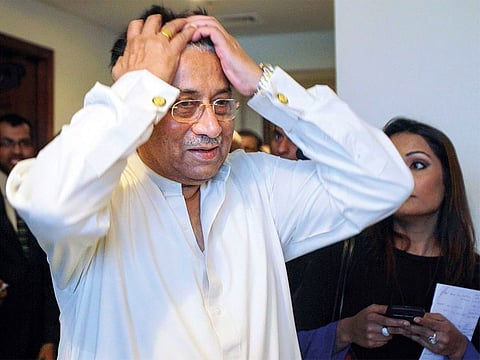Newsmaker: Pervez Musharraf: A death sentence after a life’s work
Pakistan’s ex-leader was handed death sentence in absentia for 2007 state of emergency

Politics has often been described as the ultimate blood sport — and that certainly seems to be the case when it comes to Pakistan. In Islamabad on Tuesday, a court sentenced former military dictator Pervez Musharraf to death for treason. The trial was held with the former military leader in absentia — he’s ill and lying in a bed in Dubai. And the harshness of the sentence has sent shock waves through the pillars of that febrile nation’s society.
In a strongly worded statement, the ever-powerful army said the ruling had caused “pain and anguish” in the ranks and added: “The due legal process seems to have been ignored.”
On Wednesday, the government of Prime Minister Imran Khan decided to defend Musharraf in appealing the sentence passed by a special court there.
And in a press conference shortly after the sentence was passed, Anwar Mansoor, Pakistan’s Attorney-General along with Firdous Ashiq Awan, the special assistant to Prime Minister Imran Khan, described the sentence as “unfair”.
Musharraf’s fortunes have see-sawed in the last two decades. After seizing power in 1999, he went on to survive numerous assassination attempts, and found himself on the front line of the struggle between militant Islamists and the WestMick O'Reilly
Pakistan has had periods of military rule between 1958 and 1971, 1977 and 1988, and Musharraf seized power in a 1999 coup and later ruled as president until 2008. In many ways, this prosecution and conviction of the 76-year-old former leader needs to be seen in the context of a standoff.
Charged with treason
Reporting the verdict, government law officer Salman Nadeem said “Pervez Musharraf has been found guilty of Article 6 [of the Constitution] for violation of the constitution of Pakistan.” Two of three judges decided against Musharraf, who is the first former army chief to be charged with treason there.
Musharraf imposed a state of emergency from November 2007 to February 2008, and the final years of his rule were marked by struggles with the judiciary over his wish to remain head of the army while president.
In a video issued from a hospital bed in Dubai, Musharraf said last month he was not being given a fair hearing in the case, filed in 2013 by former prime minister Nawaz Sharif, whose government was ousted by Musharraf in 1999.
Musharraf’s fortunes have see-sawed in the last two decades. After seizing power in 1999, he went on to survive numerous assassination attempts, and found himself on the front line of the struggle between militant Islamists and the West.
Pervez Musharraf was born in Delhi on 11 August 1943 to Urdu-speaking parents who migrated to Pakistan after the partition of the Indian subcontinent in 1947.
After a long career in the military he became chief of staff in 1998 under then-prime minister Nawaz — before dramatically toppling his elected government the following year. Sharif’s own popularity was at the time plunging amid an economic slump and controversial reforms, as well as fallout over a crisis in Kashmir.
Seizing power
When Sharif moved to replace Musharraf, his army chief out-manoeuvred him, spotting his chance to seize power with the weight of the military behind him.
But his decision to support US President George W Bush’s “war on terror” in 2001, following the 9/11 attacks, inevitably meant that he would end up clashing with militants sympathetic to both the Taliban — who Pakistan’s army has long-been accused of links — and Al Qaida.
Pointed questions over his record re-surfaced in 2011 when Osama Bin Laden, the Al Qaida leader, was found to have been living for years in Pakistan, not far from a military facility — something Musharraf denied he knew.
In early 2007 he sacked chief justice Iftikhar Muhammad Chaudhry, sparking a countrywide protest movement.
Months later he ordered a bloody siege at Islamabad’s Red Mosque with its adjacent Islamic school, resulting in the deaths of more than 100 people. Clerics and students of the mosque were accused of waging an increasingly aggressive campaign to enforce a strict interpretation of Sharia in the capital.
Bombing campaign
The outrage over that episode led to the creation of the Pakistani Taliban and a campaign of bombings left thousands dead.
When Sharif returned from exile in late 2007, it marked the beginning of the end of the Musharraf era.
Living in London and Dubai, the former president never made any secret that his main ambition was to return to power in Pakistan. In March 2013, he dramatically returned to compete in elections but it ended in humiliation and arrest, and his All Pakistan Muslim League performed poorly.
He became embroiled in a slew of court cases, including being accused of failing to provide adequate security for Benazir Bhutto, whose assassination by the Taliban in 2007 shocked Pakistan and the world.
The same year, he was accused of treason over his decision to suspend the constitution in 2007. The government decided to set up a special court to try him — a process that took five years before the shock ruling was announced on Tuesday.
— With inputs from agencies, BBC.
Mick O’Reilly is the Gulf News Foreign Correspondent based in Europe


